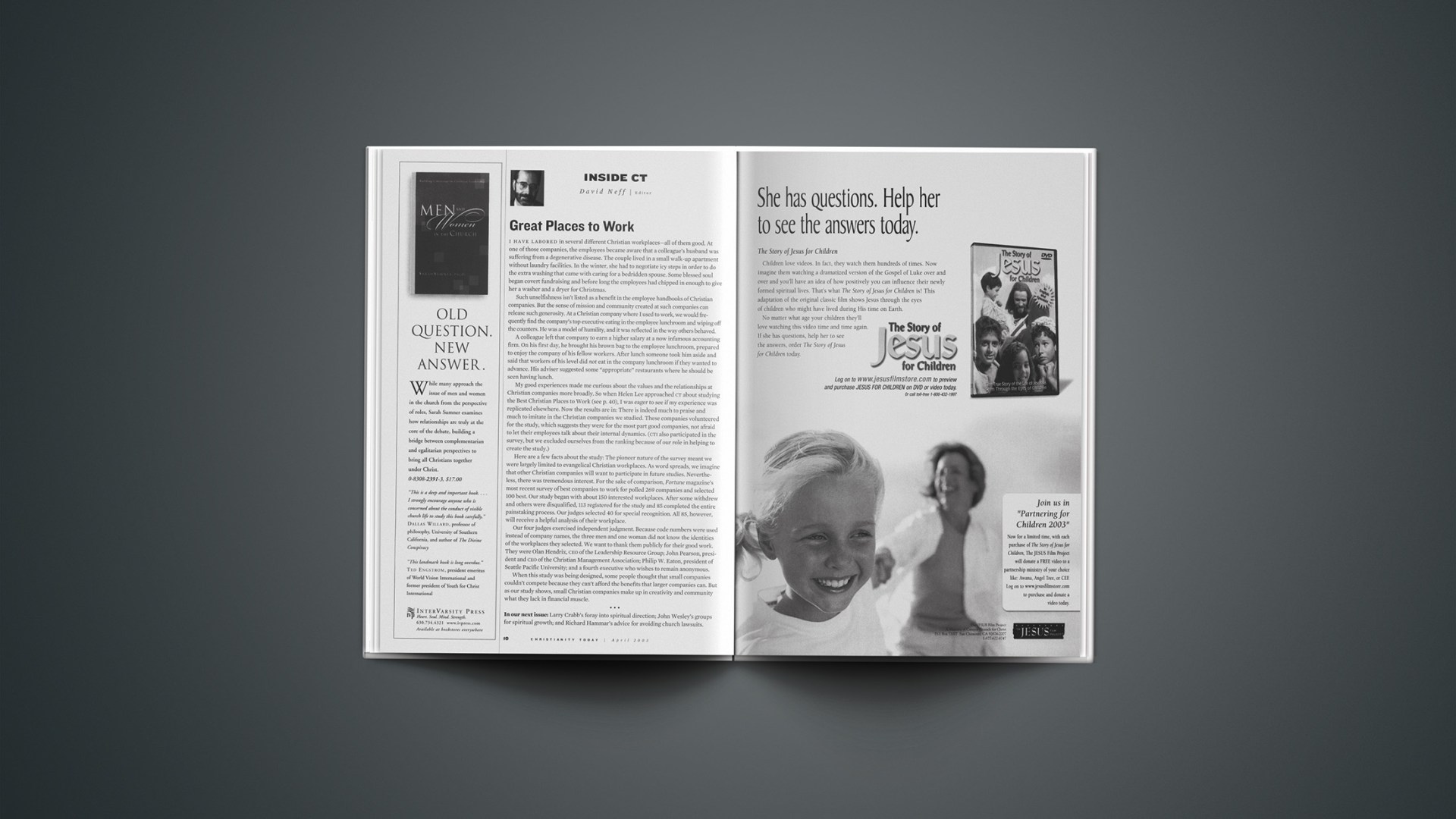I have labored in several different Christian workplaces—all of them good. At one of those companies, the employees became aware that a colleague’s husband was suffering from a degenerative disease. The couple lived in a small walk-up apartment without laundry facilities. In the winter, she had to negotiate icy steps in order to do the extra washing that came with caring for a bedridden spouse. Some blessed soul began covert fundraising and before long the employees had chipped in enough to give her a washer and a dryer for Christmas.
Such unselfishness isn’t listed as a benefit in the employee handbooks of Christian companies. But the sense of mission and community created at such companies can release such generosity. At a Christian company where I used to work, we would frequently find the company’s top executive eating in the employee lunchroom and wiping off the counters. He was a model of humility, and it was reflected in the way others behaved.
A colleague left that company to earn a higher salary at a now infamous accounting firm. On his first day, he brought his brown bag to the employee lunchroom, prepared to enjoy the company of his fellow workers. After lunch someone took him aside and said that workers of his level did not eat in the company lunchroom if they wanted to advance. His adviser suggested some “appropriate” restaurants where he should be seen having lunch.
My good experiences made me curious about the values and the relationships at Christian companies more broadly. So when Helen Lee approached CT about studying the Best Christian Places to Work, I was eager to see if my experience was replicated elsewhere. Now the results are in: There is indeed much to praise and much to imitate in the Christian companies we studied. These companies volunteered for the study, which suggests they were for the most part good companies, not afraid to let their employees talk about their internal dynamics. (CTI also participated in the survey, but we excluded ourselves from the ranking because of our role in helping to create the study.)
Here are a few facts about the study: The pioneer nature of the survey meant we were largely limited to evangelical Christian workplaces. As word spreads, we imagine that other Christian companies will want to participate in future studies. Nevertheless, there was tremendous interest. For the sake of comparison, Fortune magazine’s most recent survey of best companies to work for polled 269 companies and selected 100 best. Our study began with about 150 interested workplaces. After some withdrew and others were disqualified, 113 registered for the study and 85 completed the entire painstaking process. Our judges selected 40 for special recognition. All 85, however, will receive a helpful analysis of their workplace.
Our four judges exercised independent judgment. Because code numbers were used instead of company names, the three men and one woman did not know the identities of the workplaces they selected. We want to thank them publicly for their good work. They were Olan Hendrix, CEO of the Leadership Resource Group; John Pearson, president and CEO of the Christian Management Association; Philip W. Eaton, president of Seattle Pacific University; and a fourth executive who wishes to remain anonymous.
When this study was being designed, some people thought that small companies couldn’t compete because they can’t afford the benefits that larger companies can. But as our study shows, small Christian companies make up in creativity and community what they lack in financial muscle.
• • •
In our next issue: Larry Crabb’s foray into spiritual direction; John Wesley’s groups for spiritual growth; and Richard Hammar’s advice for avoiding church lawsuits.
Copyright © 2003 Christianity Today. Click for reprint information.
Related Elsewhere
Also appearing on our site today:
The 40 Best Christian Places to Work | What makes them so good? (Hint: Not money)
40 Best Christian Places to Work: The Complete List & A Closer Look at the Top Finalists | Christianity Today salutes four finalists in ten categories.










